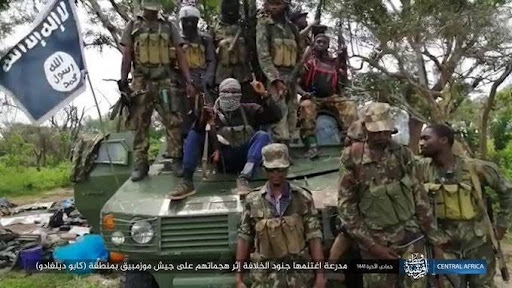
Al-Naba’a, a weekly newspaper published by the Islamic State’s central media office, has focused on spreading propaganda about its operations in Africa in its 320th issue of Thursday, Jan. 9, 2022.
Since being heavily defeated in Iraq and Syria, the Islamic State (IS) has made a sudden resurgence in Africa, recently focusing its operations in Christian-dominated areas through its affiliate, the Islamic State Central Africa Province (ISCAP).
Jihadists on the continent have generally targeted people across religions, including Muslims who do not join their ranks or subscribe to their extreme interpretation of Islamic law.
ISCAP has, however, recently targeted Christians in Congo and Eastern Mozambique, successfully converting what used to be a rebel group into a full-scale ideological Salafi-jihadi terror organisation.
Before pledging allegiance to the Islamic State, ISCAP was a militia group that fought for the central government under the name, Allied for Democratic Forces. They later evolved into full-fledged jihadi groups after joining forces with Ugandan Salafi-Jihadi fighter Musa Baluku and engaging in terrorism.
Analysts attribute the Islamic State’s rise in Africa, particularly in Christian-majority countries, to its ability to exploit the sentiments of local people with grievances against the government or other groups.
The Islamic State attempted to take advantage of these sentiments in the Al-Naba’a editorial by narrating the history of ideological conflicts between Muslims and Christians in Africa, as well as Christian missionary activities on the continent.
According to the publication, “in 1408 H (1987 AD), there were more than 100,000 Christian ‘preachers’ in Africa, and their slogan was: ‘All of Africa will be Christian by the year 2000.'”
Riding on that, the terror organisation called its fighters to infiltrate more into Christian nations to let them “know that their time of coercion against Muslims in Africa has gone with no return – Allah willing – after the Islamic State was established and its soldiers spread in multiple areas in the land of Africa.”
“What happened in the regions and villages of the Wilayat of West and Central Africa is spreading to other countries that are still under the influence of Christians,” according to the editorial.
The editorial urged supporters of the Islamic State to target Christians and Muslim leaders whom they dubbed “tawaghit”. The name, which means disbeliever, is given to any leader under democratic rule.
While mainstream Muslims regard Christians as People of the Book with whom they have closer religious ties, the terrorists regard Christians as “Salibiyyin,” or crusaders, who should be attacked.
Jihadists have terrorised thousands of Christians in West and Central Africa by attacking and destroying churches. Narrating some of the successes it recorded in terrorising people, the editorial stated that:
“The Muslims moved from a state of weakness to conquering the villages and military bases of the murtaddin and Christians and their militias, and dispersing their groups, and that was crowned with what Allah granted His worshipers of applying His Shari’ah in the land they controlled.”
Northwest Nigeria at risk
Northwest Nigeria is a conflict-torn region dominated by Muslims, with various forms of insecurity such as terrorism and communal clashes.
With local farmer-herder clashes and banditry escalating into full-fledged terrorism, the Islamic State West Africa Province (ISWAP) has seized the opportunity and is steadily establishing a presence in the region and generating recruits.
A masked man with a Zamfara-Sokoto Hausa dialect was shown speaking and promising to continue waging ‘jihad’ in a video released recently by the ISWAP and seen by HumAngle.
Although not as powerful as their counterparts in the Northeast, ISWAP fighters in the region attacked a military position in Sokoto last year, killing soldiers and seizing weapons.
With the current trend of its propaganda dissemination, the IS affiliate group will likely continue to exploit local grievances to recruit fighters especially among the tribal militias in the area.
Wherever it attempts to infiltrate, Islamic State tries to bring a theological justification for waging violence through teaching extremist ideology.
To build a generation of fighters, children as young as 10 years are taught Arabic language and grammar to understand religious texts and military skills to grow up waging violence.
Support Our Journalism
There are millions of ordinary people affected by conflict in Africa whose stories are missing in the mainstream media. HumAngle is determined to tell those challenging and under-reported stories, hoping that the people impacted by these conflicts will find the safety and security they deserve.
To ensure that we continue to provide public service coverage, we have a small favour to ask you. We want you to be part of our journalistic endeavour by contributing a token to us.
Your donation will further promote a robust, free, and independent media.
Donate HereStay Closer To The Stories That Matter




